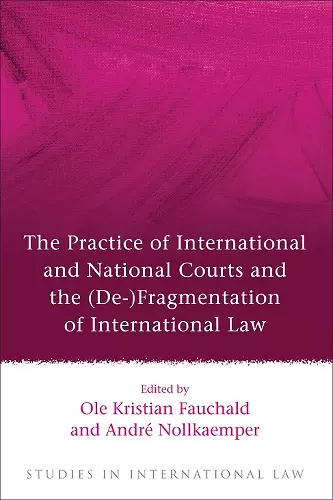The Practice of International and National Courts and the (De-)Fragmentation of International Law
Ole Kristian Fauchald editor Professor André Nollkaemper editor
Format:Paperback
Publisher:Bloomsbury Publishing PLC
Published:28th Aug '14
Currently unavailable, and unfortunately no date known when it will be back

In recent decades there has been a considerable growth in the activities of international tribunals and the establishment of new tribunals. Furthermore, supervisory bodies established to control compliance with treaty obligations have adopted decisions in an increasing number of cases. National courts further add to the practice of adjudication of claims based on international law. While this increasing practice of courts and supervisory bodies strengthens the adjudicatory process in international law, it also poses challenges to the unity of international law. Most of these courts operate within their own special regime (functional, regional, or national) and will primarily interpret and apply international law within the framework of that particular regime. The role of domestic courts poses special challenges, as the powers of such courts to give effect to international law, as well as their actual practice in applying such law, largely will be determined by national law. At the same time, both international and national courts have recognised that they do not operate in isolation from the larger international legal system, and have found various ways to counteract the process of fragmentation that may result from their jurisdictional limitations. This book explores how international and national courts can, and do, mitigate fragmentation of international law. It contains case studies from international regimes (including the WTO, the IMF, investment arbitration and the ECtHR) and from various national jurisdictions (including Japan, Norway, Switzerland and the UK), providing a basis for conclusions to be drawn in the final chapter.
The subject matter addressed in this edited volume is timely as international and national courts increasingly apply international law... This book provides a rich and complex survey of how fragmentation in international law is being countered (or not) by international and national courts through a wide variety of ways and means. It is important to note that it reads more as a series of substantive case-studies than as a comprehensive analysis of fundamental normative questions – a point which the editors acknowledge. This is understandable given that further scholarship, especially on the normative and empirical aspects, on the role of international and national courts in relation to fragmentation needs to be undertaken, and I believe that this book has contributed in no small way toward that effort. -- Tan Hsien-Li * ASIL Cables, The Official Daily of the American Society of International Law Annual Meeting *
ISBN: 9781849466639
Dimensions: 234mm x 156mm x 18mm
Weight: 582g
382 pages